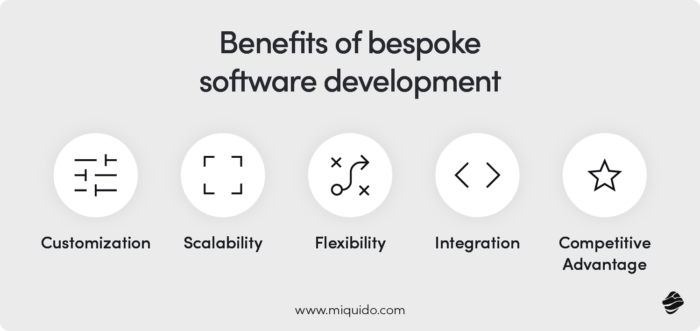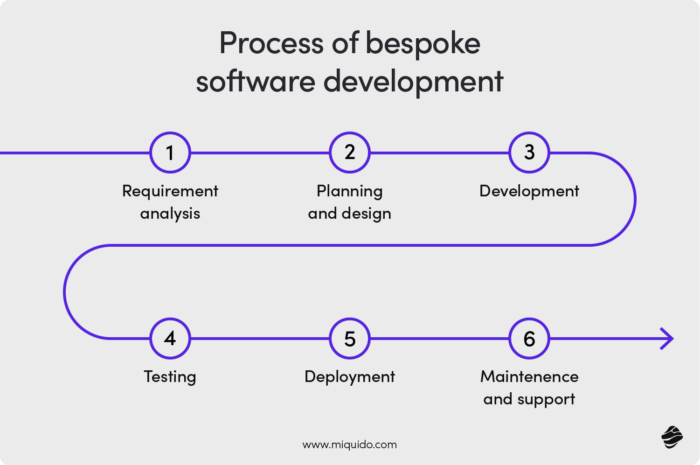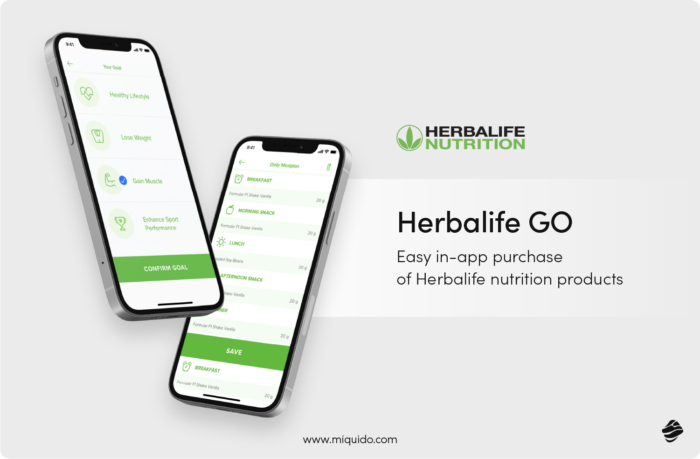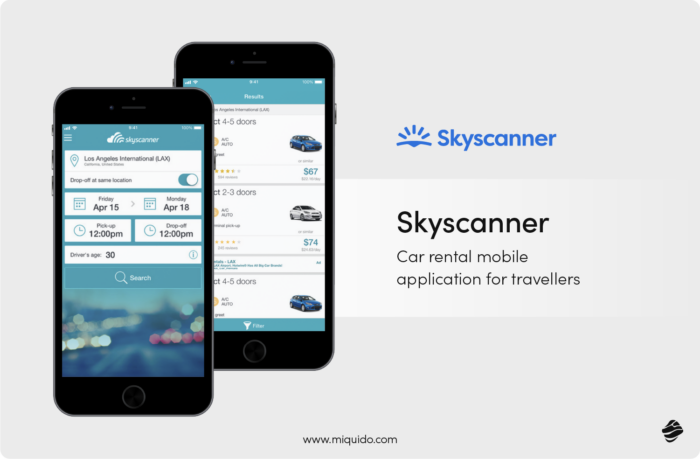In today’s digital market, despite the increasing number of products designed to meet specific needs and ready-to-deploy platforms, many companies still prefer to take matters into their own hands. After all, off-the-shelf solutions always require some compromises, whereas bespoke software can fully meet a company’s unique needs.
Who and why are choosing bespoke software development today? When is this the right path, and when is it better to opt for a different solution? What should you consider when collaborating with a bespoke software development company? We will cover these and other topics in our article. Discover successful bespoke software solutions from around the world and learn from the best.
What is Bespoke Software Development?
In summary, bespoke software development is the process of creating software from scratch, from concept to final implementation. Several phases of the process are involved: requirement gathering, planning and design, development, testing, deployment, and maintenance.
Bespoke Software Development vs Off-the-Shelf Software – What’s the Difference?
Bespoke software, also known as custom software, stands in contrast to off-the-shelf solutions, which are pre-built and readily available for purchase or use. These may be available as SaaS or for one-time purchase.
In some cases, such as developing bespoke software for a company’s clients, bespoke software development is the only viable option. In other situations—like internal solutions for reporting, ticket management, document flow, or a sales platform—it often competes with off-the-shelf solutions, especially in the SaaS model.
Today, providers of bespoke business software strive to offer a certain level of flexibility, such as by dividing their solutions into modules. However, compromises are always inevitable. Sometimes, this means features that don’t align with a company’s needs, unnecessarily burdening the user interface and budget. Other times, it’s the opposite—certain features may be missing, or there may be no ability to scale to other markets.
With tailored software, such problems are avoided as its scope is based on an in-depth analysis of needs. For example, a bespoke development company can ensure that the software is perfectly suited to a business’s specific requirements. Examples of bespoke solutions might include custom CRMs, ERPs, or e-commerce platforms that are uniquely tailored to the business.
What is Bespoke Software: Common Misconceptions and Clarifications
When considering custom software development, companies often approach it with caution, fearing time-consuming implementation and high costs. However, in reality, they don’t have to be stuck with these drawbacks—quite the contrary. Bespoke software development doesn’t have to take a long time or consume an ever-growing budget.
Implementing the best mobile app development frameworks that focus on a specific scope can shorten development time and reduce expenses. We have created such a framework—AI Kickstarter—that allows companies to easily integrate artificial intelligence into their structures. It’s not an off-the-shelf solution, but it allows for a shortcut while maintaining the highest quality and completing implementation three times faster.
Another common misconception is that bespoke software development means months of coding. Yes, many companies still focus on using traditional technology stacks, which ultimately have many advantages, from flexibility to maximum security control. However, some opt for no-code tools instead. It all depends on the project’s characteristics.
Benefits of Bespoke Software Development
Choosing the custom path offers many advantages, although it is not always the ideal solution. What are its strengths?

Customization
As mentioned earlier, bespoke software development allows you to tailor software to specific business processes and needs. You don’t have to search the market in hopes of finding something fully aligned with your needs—you simply create it. You don’t waste money on subscribing to a tool whose features you don’t use.
And if you wish, you can cover all of your company’s needs with one comprehensive system, reducing information silos and streamlining data flow, which can later be used to derive valuable insights.
Scalability
Off-the-shelf solutions are often designed with specific business sizes, growth rates, and market presence in mind. Once you go beyond these limits, you may find that the software no longer supports your new needs.
Bespoke software development provides you with the ability to scale as your business grows. For example, you can enter the B2B sales sector or adapt your solution to new markets. It maintains the same performance despite the growing number of users and queries sent to the server.
Flexibility
With off-the-shelf solutions, you are somewhat “at the mercy” of the vendor. You can only hope that they will adapt to changes and evolving business requirements—but unfortunately, this isn’t always the case. Updates might not be as frequent as you would like, and functionalities might not cater to changing demographics and the resulting new needs.
With bespoke software development, there are no such dilemmas. A new need or some new top mobile app development trends emerge, and you can immediately adapt to it.
Integration
Integration limitations are a serious drawback of off-the-shelf software, especially now when data is the new gold. You may collect data from various sources, including other custom systems, which might be impossible to connect to a ready-made software solution.
By choosing a bespoke software solution, you don’t have to change your existing solutions or business processes—the large language models, ERPs, CRMs, PIMs, and other key business management tools you use can be integrated without any issues. You have full freedom in selecting providers (no vendor lock-in), and you don’t have to worry about what will happen next.
Competitive Advantage
As the internet and mobile app environment become increasingly crowded, standing out is more valuable than ever. Unique functionalities, unusual interface elements, graphics, and integrations with GenAI—all of these can help you gain an edge over competitors. With an off-the-shelf software solution, you probably won’t be able to implement them.
The custom software development process in this model can vary significantly depending on what is being created, how, and for whom. However, a bespoke software development company generally follows a certain order, which we will outline below. These companies excel in creating bespoke solutions that cater specifically to your business needs, ensuring seamless integration and enhanced competitive advantage.
Process of Bespoke Software Development
The process of developing software in this model can vary significantly depending on what, how, and for whom it is being created. However, software houses generally follow a certain order, which we will outline below.

Requirement Analysis
At this stage, the team gathers and analyzes business needs. The work often begins with a workshop involving the software house, the company, and its stakeholders. Brainstorming sessions and various exercises are conducted to identify the project’s key business objectives, KPIs, and requirements.
Requirements are essential to ensure that the final product aligns perfectly with the business goals and addresses all identified challenges. They are established in detailed documentation, including functional specifications and user stories. This process ensures that the development team has a clear understanding of what needs to be built and how it will benefit the end users.
Planning and Design
The next step is creating a blueprint and design of the software. Based on the gathered requirements, the scope of functionalities to be developed in subsequent stages is determined. The team sketches these out in the form of wireframes, working on user experience and testing different application paths.
A key element of this stage is creating detailed architectural diagrams that define how different components of the system will interact. It should conclude with a comprehensive design document that serves as a roadmap for developers. This will enable a smooth transition to the development phase, minimizing the chances of scope creep or miscommunication.
Development
At this stage, developers bring the designers’ vision to life based on the solutions developed in the previous phase. The software is typically built with regular feedback loops to enable quick adjustments.
Development teams usually work in short, 2-week iterations, known as sprints, where they build and test parts of the software incrementally. After each sprint, the results are reviewed by the involved parties, allowing for continuous improvement and alignment with the project goals.
Testing
Before the software reaches the users, whether they are your clients or company employees, you must ensure that everything functions correctly. The testing phase is crucial for ensuring the software is bug-free and meets requirements.
This phase guarantees that the software performs as expected under various conditions, including stress testing, and that any defects are identified and resolved before deployment. Testing also includes user acceptance testing (UAT), where the actual end-users validate the software to ensure it meets their needs.
Deployment
We’ve reached the finish line! It’s time to deploy the software developed through this multi-faceted process into the business environment. At this stage, the software is installed on the production servers, and all necessary configurations are made to ensure it operates correctly.
It is very important here to coordinate with all stakeholders to ensure a smooth transition, minimizing downtime and disruption to business operations. Additionally, thorough training and support documentation should be provided to users to facilitate the adoption of the new system.
Maintenance and Support
While it may seem like the end, the journey with software development doesn’t end here. Software, in a sense, is like a garden—planting the seeds and watching everything grow isn’t enough. It needs to be maintained continuously. This includes addressing technical issues as they arise, improving performance based on user feedback, and fixing bugs reported by users.
Maintenance also involves updating the software to accommodate new technologies or evolving business needs. Fortunately, companies specializing in bespoke software development usually take care of these aspects, offering ongoing support and updates to ensure the software remains effective and relevant over time.
When to Choose Bespoke Software?
Opt for bespoke software when your business needs include:
- Unique functionality that off-the-shelf options can’t provide.
- Scalability and flexibility to support growth and integration with other systems.
- A competitive edge through custom features.
This solution is ideal for:
- Large enterprises with complex needs.
- Innovative startups creating novel products.
- Niche markets requiring specialized solutions.
When to Choose Off-the-Shelf Software?
Choose off-the-shelf software if your needs are:
- Standardized and don’t require customization.
- Budget-conscious with a need for quick deployment.
- Non-critical, like for basic internal tools.
Best for companies like:
- Small to medium-sized businesses need cost-effective solutions.
- Organizations requiring immediate, proven software.
Learn the Meaning of Bespoke Software Development through Real-World Examples
As a software house, we specialize in developing custom mobile applications, web, and cross-platform apps daily. Some of our notable clients for bespoke software projects include Skyscanner, TUI, Abbey Road Studios, HelloFresh, Empik, Brainly, and Social Bee.
Drawing from our extensive experience in eCommerce, we can confidently say that bespoke software development thrives despite the availability of many ready-made solutions. Companies recognize that SaaS solutions often impose limitations, such as vendor lock-in and rigid constraints on design and functionality.
Herbalife GO

Our work with Herbalife on the Herbalife GO app demonstrates how investing in a custom shopping app can yield significant benefits. We were able to create a bespoke solution that goes beyond just providing easy access to products.
It introduces features directly related to the products, motivating and inspiring users to make purchases and use the products while offering added value to the user. Achieving this with off-the-shelf solutions would have been impossible.
Skyscanner Rental App
Our work with Skyscanner is a prime example of how bespoke software solutions can elevate user experiences through innovative mobile technologies. By updating the Skyscanner app with Java for Android and Objective-C for iOS, we integrated Google Maps API and MapKit, making the Skyscanner Car Rental feature more intuitive. This bespoke software integration allowed users to explore rental locations and manage car pick-ups and drop-offs effortlessly.

To further enhance the app, we developed a software solution that included location-based rental searches, advanced filtering options, and a last-minute rental feature. These bespoke software solutions significantly increased user engagement, offering a personalized and competitive experience that meets users’ needs.
TUI
The collaboration between TUI and our team exemplifies how a tailored approach to software development can drive substantial operational efficiency and customer satisfaction. By focusing on TUI’s unique needs, we crafted a custom solution that seamlessly integrates travel destination selection, booking, and management into a single mobile app. This agile development methodology allowed us to iterate quickly, delivering a top-rated app that not only simplifies the booking process but also enhances the overall travel experience for users.

Unlike commercial software, which often lacks the flexibility needed to adapt to specific business demands, our bespoke approach ensured that TUI could meet the expectations of their mobile-oriented customers while efficiently handling customer data and trip management.
Choose the Right Partner for Bespoke Software Development
It’s not that easy—many requirements need to be met. Experience is obviously important, but actual case studies and a comprehensive portfolio should back it. Client reviews and testimonials are also worth a closer look.
They’ll help you verify first impressions and get a “feel” for a potential partner in mobile or web app development. Do a bit of research on Clutch—read how the company handles communication and collaboration with the client’s team on projects.
There’s a good chance we’ll check off all, or at least most, of your requirements. We’ve been in this field for over ten years and know the rules of the game inside out. Browse our projects, check out our Clutch reviews, and see for yourself! We’d be happy to discuss the potential for implementing bespoke software development services and help you reach out for the advantages of bespoke software.







![[header] everything you need to know about software projects outsourcing](https://www.miquido.com/wp-content/uploads/2023/12/header-everything-you-need-to-know-about-software-projects-outsourcing-432x288.jpg)

